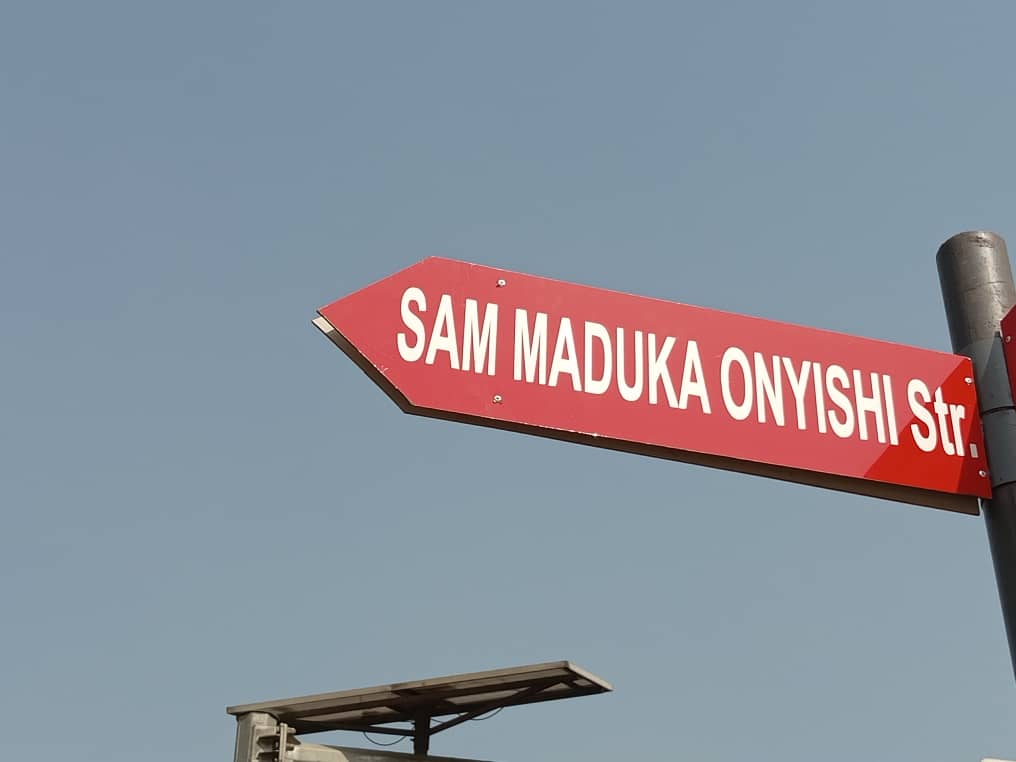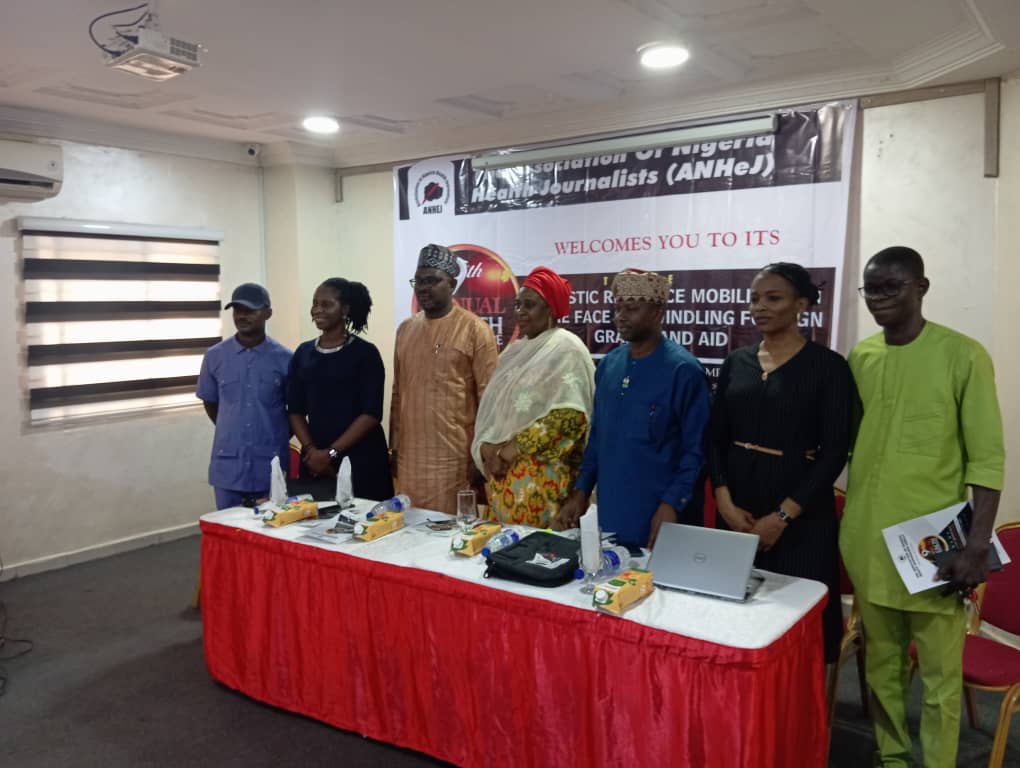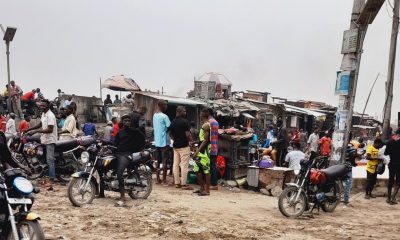NEWS
Women Representation: INEC Tasks NASS on Affirmative Action

The Independent National Electoral Commission (INEC), has urged the National Assembly to introduce affirmative action to address low level of gender representation in elective positions nationwide.
This, the commission said, should be part of the ongoing national assembly electoral reforms.
INEC Chairman, Prof.
Mahmood Yakubu stated this at an event “Celebrating Women in Election Management,’’ organised by the commission to commemorate the International Women’s Day (IWD), in Abuja on Friday.The main theme of the 2024 celebration is “Invest in Women: Accelerate Progress” while the campaign theme is: “Inspire Inclusion”.
Yakubu said that INEC was aware of the concerns raised by Nigerians about the low level of gender representation in elective positions nationwide.
“The commission shares this concern and we have consistently been urging political parties to redress the obvious under-representation of women, youths and persons with disability by nominating more of them as candidates for elections.
“The national assembly should introduce affirmative action as part of the electoral reforms that will ensure greater representation of women, youths and persons with disabilities in elective offices nationwide.
“In the weeks ahead, the commission will engage with the Senate and House of Representatives Committees on Electoral Matters on this and other areas of reforms,’’ he said.
Yakubu said that INEC is delighted to celebrate the IWD as a practical affirmation of its commitment to deepening gender equality, representation, relevance, empowerment and a sense of belonging.
He said that inclusion had been a focal area of INEC commitment covering gender, youths and persons with disabilities.
He said that INEC had since developed, validated and dutifully implementing its gender policy in a practical way.
“It is not by coincidence that the two successive secretaries to the commission are women.
“Furthermore, the present commission deliberately created a whole Department of Gender and Inclusivity in 2021, dedicated to the promotion of inclusive representation in the workplace and the electoral process.
“Today, out of 24 Departments and Directorates at the commission’s Headquarters, 11 (representing 46 per cent) are headed by women.
“We also have women serving as administrative secretaries in our state offices and heads of various departments at state levels.
“There is also no state in Nigeria without women serving as Electoral Officers (EOs) in charge of our local government offices,’’ Yakubu said.
Prof. Kunle Ajayi , the INEC National Commissioner and Chairman, Outreach and Partnership Committee, said that INEC under Yakubu remained committed to electoral inclusion of women.
Ajayi said the commission was aware of abysmal under representation of women in active politics and appointed positions, both at national and grassroots levels.
This, according to him, has been an issue of great concern to the commission in spite series of targeted interventions to ensure equal gender participation and representation in the electoral process.
He enumerated various policies, actions and programmes by INEC to promote gender inclusion in the election management process.
“Now, INEC is looking at the more scientific and data based approach in addressing gender gaps and improving women participations in the electoral space.
“To this end, the commission is very open to actionable recommendations to our versatile members of staff.
“We also welcome more productive collaborations and engagements with other development partners in our quest to further advance gender equality and women empowerment in our society,’’ he said.
On her part, Secretary to the Commission, Mrs Rose Oriaran-Anthony, said the event was a pointer to the collective recognition of the contributions and commitment of women toward improving electoral process, especially as leaders in the public service.
Oriaran-Anthony said the photo-book served as a visual tribute to women’s leadership and catalyst for change, sparkling conversations, fostering empowerment and progress toward a more equitable and just society.
“Within the pages of this remarkable publication, we are presented with a visual chronicle of the indomitable spirit and unwavering dedication of women who have played pivotal roles in shaping the electoral landscape of our nation.
“Their stories are not just tales of triumph but testaments of resilience, courage, dedication and a steadfast commitment to public service.
“Each photograph captured within these pages serves as a selfless and poignant reminder of the transformative power that is wielded by women in leadership positions.
“Their presence symbolises that beacon of hope, the flicker of light illuminating the path toward gender equality, inclusivity, and meaningful and impactful participation in governance,’’ she said.
The highlight of the occasion was the unveiling of a Plague and Photo Book of women, who had contributed to expansion of women participation in elective positions, advancement of democracy and development in Nigeria.
Reports says that the plague and Photo Book was produced by The Electoral Hub in collaboration with INEC Gender and Inclusivity Department.
There was knowledge and experience sharing session by past and present management staff of INEC, including national commissioners, Mrs May Abamuche-Mbu and Prof. Rodah Gumus, as well as former national commissioner, Hajia Amina Zakari .
Others included Resident Electoral Commissioner, Mrs Toyin Babalola; retired directors, Regina Omo-Agege, and Blessing Obidekwu.
Yakubu, thereafter, unveiled the INEC Crèche, built and equipped for nursing mothers working in the commission. (NAN)
NEWS
SDP Leader, Adebayo Celebrates Tanko Yakasai at 100

By Mike Odiakose, Abuja
The National leader and former presidential candidate of the Social Democratic Party (SDP), Prince Adewole Adebayo, has joined other well meaning Nigerians with felicitate with an elder statesman, Alhaji Tanko Yakasai as he turns describing his new age as rare and majestic
In a congratulatory message on the auspicious event, Adebayo said: “Your life has become so deeply interwoven with the political journey of Nigeria that celebrating you is, in truth, celebrating the nation itself.
“Your 100 years summon not just admiration but reverence, for your presence in our national life reminds us of the long road we have travelled, the storms we have weathered, and the promises we must still labour to fulfill.
“Today is not merely a birthday; it is a national moment of reflection. It is the commemoration of a lifetime that stretches across a century of our collective hopes, struggles, triumphs, disappointments and renewed aspirations. It is the celebration of a man whose personal story is etched so deeply into the conscience of Nigeria that to speak of you is, in many ways, to speak of Nigeria’s own soul.
“Whenever I reflect on your life, I am struck by the truth that Nigeria has produced many public figures, but very few have endured with the consistency, clarity, courage and moral steadiness that define your towering legacy.”
He eulogized Alhaji Yakasai noting that in spite of the fact in 1925 when he was born when colonial rule held sway and the idea of an independent Nigeria was a distant horizon, Yakasai still emerged early as someone with a restless and determined spirit. ‘You were a young man who believed that freedom, justice and dignity must become the inheritance of all Nigerians, not privileges for the few. From your early activism in Northern Elements Progressive Union (NEPU) under the luminous guidance of Mallam Aminu Kano to your pivotal roles in shaping the First and Second Republics, the conviction that Nigeria must work for all her people has guided your entire life. That conviction has remained unsullied, unbent and unbroken.
“Whenever I listen to you or read your reflections on governance and nationhood, I am reminded of the rare blessing Allah has bestowed upon you; the blessing of a mind that refuses to age. At 100, your intellect retains the sharpness of a scholar, the discipline of a statesman and the moral clarity of a patriot who has never, for one day, retired from the obligation of thinking about Nigeria’s progress,” Adebayo stated.
He said every nation needs its moral anchors, noting that Yakasai represents one for Nigeria. He described the elder statesman as a living archive, a grand repository of wisdom shaped not by speculation but by lived experience, frontline service, courage in the face of repression and sacrifices made for the greater good. “You speak of colonialism, independence, coups, transitions, reconciliation and democratic rebirth not as someone who observed history from the gallery but as one who stood in the arena, feeling its dust and its fire.
“You have seen Nigeria in her brightest dawns and in her darkest nights. You have watched leaders rise with promise and fall through hubris; you have watched institutions flourish with hope and decay under neglect; you have seen policies lift citizens into dignity and others plunge them into despair.
“You have advised presidents, mentored young politicians, challenged those whose paths strayed from justice and comforted those whom the system forgot. Through all these shifting seasons, you have remained firm in principle, fearless in speech and unbending in patriotic devotion. “Whenever I consider my interactions with you, I am reminded that leadership is not a performance staged for applause but a sacred responsibility, that patriotism is not a slogan repeated for convenience but a lifelong covenant and that nation-building is not an event but a relay and you have carried your baton with honour for 100 years,” he said.
He described him as a man whose courage deserves its own chapter in Nigeria’s book of heroes, stressing, “You are not the kind of elder statesman who retreats into the comfort of age to offer safe or vague commentary. You speak truth even when truth is costly. You defend unity even when unity is under assault. You insist on justice even when justice is unfashionable. And for these convictions, you endured arrests, detentions and public criticisms; yet you remained unbroken. Your steadfastness is a rebuke to cynicism and a beacon to a generation that must rediscover its moral compass.”
He also described the people of Kano and the wider Northern region as a cultural treasure and a historic pillar, whose contributions helped shape regional identity and civic consciousness. “Yet you are far greater than a northern icon; you are a national symbol. Throughout your long and distinguished life, you have championed the idea that Nigeria’s diversity is not a burden but a divine blessing, provided we govern with fairness. Your friendships and alliances cut across ethnicity, religion, region and ideology. For a man who has witnessed nearly every storm of our national life to still believe so passionately in Nigeria’s potential is a profound testimony to your faith, resilience and patriotism. As you turn 100, my heart overflows with gratitude to Almighty Allah for preserving you,” he stated.
He prayed to God to strengthen him and bless his remaining years with peace, joy and fulfillment, adding that longevity is a gift but purposeful longevity is a miracle.
Continuing, he said: “May God preserve your wisdom for generations yet to come and may He grant that Nigeria, the nation you have served with body, mind and conscience, may one day, fully embody the ideals of justice, unity, compassion and accountable leadership that you have defended all your life. Your example calls every Nigerian to honesty in speech, fidelity in service, love for our country even when she stumbles and an unshakeable belief in the dignity of every citizen. If we imitate even a fraction of your courage and moral clarity, Nigeria will, undoubtedly, become a better nation.
“And so, today, we are not merely celebrating a birthday; we are celebrating a century of service, a century of conviction and a century of national memory. Alhaji Tanko Yakasai, you are a rare gift to Nigeria. Your life is a national treasure, a guiding light, a moral compass and a historical archive wrapped in human form.
“On this joyful day, on behalf of my family, my associates and every Nigerian who cherishes the values you embody, I honour you with deep respect, profound affection and sincere admiration. “Happy 100th birthday, Alhaji! Nigeria salutes you. History remembers you. The future will learn from you and may Allah bless you always. God bless the Federal Republic of Nigeria.”
NEWS
Street Named After Business Mogul, Sam Maduka Onyishi Unveiled in Asokoro

By David Torough, Abuja
Authorities in the Federal Capital Territory on Saturday honoured renowned entrepreneur and philanthropist, Chief Dr. Sam Maduka Onyishi, with the unveiling of a street named after him in Asokoro, Abuja.
Speaking at the event, the representative of the Abuja Metropolitan Management Council’s Department of Street Naming, Mr.
Charles Adikwu, said the honour was in recognition of Onyishi’s remarkable contributions to national development, job creation, and community upliftment.Adikwu described the Peace Mass Transit founder as “a businessman who built his enterprises from scratch to the top,” noting that Onyishi has grown into one of Nigeria’s most influential private-sector employers.
The honouree is the Chairman of Globus Bank, Peace Microfinance Bank, Peace Oil & Gas, Peace Mass Transit, and the Chancellor of Sam Maduka University, Akwegbo, Enugu. According to Adikwu, Onyishi’s businesses have collectively provided employment to over 150,000 Nigerians, making him “one of the highest employers of labour in the country.”
Adikwu added that naming streets after distinguished Nigerians also enhances security and navigation within Abuja communities.
“If anything happens along this route, it can now be easily identified as taking place at No. 7 Sam Maduka Onyishi Street,” he said. “Before now, locating places involved unnecessary descriptions that sometimes complicated emergency responses.”
Also speaking, the Regional Manager of Peace Mass Transit (Northern Region), Mr. Ngwu Jude Chinweike, said the gesture reflects government’s increasing willingness to recognise individuals who positively impact society.
He expressed delight that his principal was among those honoured, describing the development as a morale boost for communities and a reminder that meaningful contributions do not go unnoticed.
“The public will now understand that when you make positive impact in your community, government has a way of recognising your efforts,” he said.
Chinweike noted that the newly named street is already attracting interest from businesses and institutions, including security agencies, and assured that Peace Mass Transit and Onyishi’s other subsidiaries would support efforts to enhance the area’s outlook.
“Since the street bears his name, we will keep our eyes here and contribute to ensuring it looks good,” he added.
Chief Dr. Sam Maduka Onyishi, widely regarded for his philanthropy and transformative investment footprint, continues to maintain an active presence in transportation, finance, energy, and education sectors across the country.
NEWS
Experts Task Government on Increase in Domestic Funding

By Laide Akinboade, Abuja
Experts in the health sector, at the weekend agreed that even though foreign grants and aid remain highly valuable, it is imperative for the three tiers of government to increase domestic funding in Nigeria.
They agreed that it is only through the above the nation can build a resilient, domestically financed health system.
This was agreed at the 9th annual health conference organized by the Association of Nigeria Health Journalists (ANHeJ) in Abuja.
The theme of this year conference is ‘Domestic Resource Mobilization in the Face of Dwindling Foreign Grants and Aids’ .
Among those who spoke at the occasion, include, Special Adviser to President on Health, Dr.
Salma Ibrahim Anas, .Minister of State for Health and Social Welfare, Dr. Kunle Salako, representative from National Agency for Food and Drug Administration and Control, (NAFDAC), Dr. Matins Illuyomade,Salako who was represented by his Special Adviser, Dr. Babatunde Akinyemi, said Nigeria has benefited from substantial foreign health assistance, including over $6 billion from PEPFAR, $2.5 billion from the Global Fund, $1.5 billion from the World Bank, $1.2 billion from Gavi, and $1.6 billion from the Bill & Melinda Gates Foundation.
He stressed, that government initiatives under the Renewed Hope Agenda and the Nigeria Health Sector Renewal Investment Initiative (NHSRII), including the Basic Health Care Provision Fund (BHCPF), which has disbursed over N260 billion to states and the Federal Capital Territory since 2018, and the National Health Insurance Authority (NHIA) Act, mandating health insurance for all Nigerians.
He said, “The United States government, through PEPFAR, has invested over $6 billion in Nigeria’s HIV/AIDS response since 2004, with annual allocations averaging $400-450 million in recent years. In fiscal year 2023 alone, USAID (Now DoS) allocated approximately $535 million for health programs in Nigeria, covering HIV/AIDS, malaria, tuberculosis, and maternal and child health initiatives.
“The Global Fund to Fight AIDS, Tuberculosis, and Malaria has disbursed over $2.5 billion to Nigeria since 2003, making us one of the largest recipients globally. The World Bank currently supports our health sector with approximately $1.5 billion through various projects, including the $500 million Nigeria COVID-19 Action Recovery and Economic Stimulus Program and the $820 million International Development Association credit for primary healthcare strengthening. Similarly, Gavi, the Vaccine Alliance, has committed over $1.2 billion to Nigeria since 2001 for immunization programs, while the Bill and Melinda Gates Foundation has invested approximately $1.6 billion across various health interventions in Nigeria over the past two decades.
“The United Kingdom’s Foreign, Commonwealth and Development Office (FCDO), though reducing its overall aid budget, continues to invest significantly in Nigeria’s health system, particularly through the £210 million Health Systems Strengthening program. The European Union and its member states collectively provide approximately €100 million annually for health-related interventions, while the Government of Japan, through JICA, supports our health infrastructure development with grants averaging $30 million annually.
.Multilateral development banks and financial instruments have also remained vital partners; the World Bank in 2024 approved substantial concessional financing, including a major credit and complementary grant financing package that supports health outcomes and health system resilience across states and communities. Such financing is targeted not only at service delivery but at strengthening our ability to prevent, detect, and respond to emergencies”.
Salako noted, “Foreign grants and aid remain highly valuable and will continue to finance critical interventions for some time. But the future we must build is one where domestic resource mobilization, fiscal discipline, efficient spending, and innovative financing are the engines that sustain our national health priorities. The Government of Nigeria is already advancing legal and budgetary instruments, leaning on proven programme data, and working with partners to protect gains while we scale domestic financing.
“Our commitment is to ensure that no Nigerian is left behind during this transition, and that we convert a period of funding volatility into a long-term opportunity to build a resilient, domestically financed health system”.
The Minister of state also enumerated the innovative domestic financing efforts at the state and private sector levels.
“Lagos State allocates over 12% of its budget to health, Kaduna State’s contributory health scheme has enrolled 1.6 million residents, and Abia State has launched a diaspora health investment fund.
“The Private Sector Health Alliance of Nigeria and the Nigeria Sovereign Investment Authority contributed over N50 billion and $200 million, respectively, to health initiatives,” he said.
Dr. Salma, in her presentation, said, donor fatigue is real, and the inevitable graduation of Nigeria from various aid programs is approaching.
In his welcome address, ANHeJ President, Joseph Kadiri, said the conference theme, “Domestic Resource Mobilisation in the Face of Dwindling Foreign Grants and Aid,” underscores the urgent need to strengthen domestic financing, partnerships, and resilient health institutions.
Kadiri called on journalists to track government commitments, highlight gaps, and amplify the realities faced by Nigerian families.





















